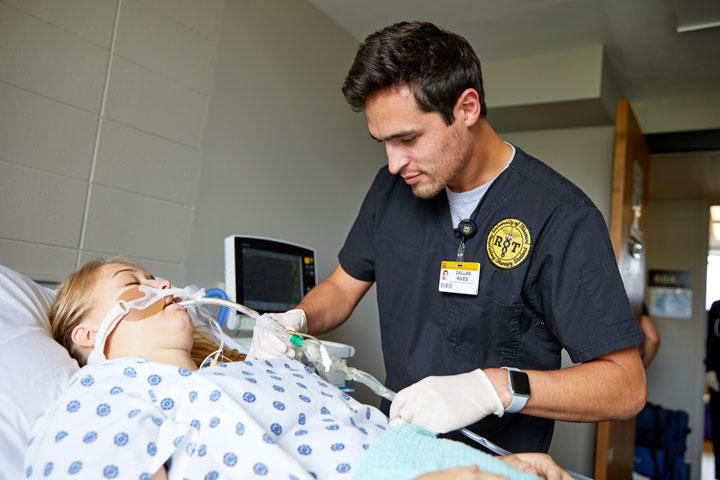What is respiratory therapy?
Mizzou’s Respiratory Therapy program prepares students to become licensed respiratory therapists equipped to assess, diagnose and treat patients with breathing-related conditions. Respiratory therapists serve patients of all ages. They operate advanced medical equipment, including mechanical ventilators, therapeutic gas administration apparatus, pulmonary function testing devices, and aerosol generators. Graduates are thoroughly prepared to sit for the national board exam, ensuring a strong foundation for their careers in this essential health care field.
Don’t just take our word for it. Watch the video below to learn more about a career in respiratory therapy.
What classes will I take?
Before entering the clinical phase of the program, students complete general education requirements and program prerequisites. The program includes a secondary application process, where students must apply and be accepted to proceed to the clinical phase.
Respiratory therapy students receive comprehensive clinical instruction paired with academic coursework. This includes classes such as:
- Mechanical Ventilation Lab
- Pulmonary Rehabilitation
- Pediatric Respiratory Care
- Clinical Rotations
Are there experiential learning opportunities?
Yes! The University of Missouri believes in learning by doing. The Respiratory Therapy bachelor’s degree program incorporates over 1,000 hours of hands-on clinical experience, giving students the opportunity to apply classroom knowledge in real-world health care settings.
Become a respiratory therapy major
You can pursue a respiratory therapy degree at any point in your career at Mizzou. To begin the clinical phase of the Respiratory Therapy program, students must complete a secondary application and receive admission.
- New students: Apply to MU and choose Respiratory Therapy – Pre Health Sciences as your major.
- Current students: Declare or change your major.
Frequently asked questions
A major in respiratory therapy is perfect for students who are passionate about health care and eager to make a direct impact as bedside caregivers. This program focuses on caring for patients of all ages with conditions affecting the respiratory system. It’s an ideal path for compassionate individuals who are tech-savvy, detail-oriented and skilled problem-solvers. Respiratory therapy also provides an excellent foundation for those interested in perfusionist, physician assistant, or medical school programs.
A bachelor’s degree in respiratory therapy prepares graduates to sit for national examinations given by the National Board for Respiratory Care. Mizzou Respiratory Therapy graduates have high pass rates that are well above the national average.
In addition to the earned credential, a license or registration is required to practice in all states except Alaska. Graduates will need to start this process immediately after graduation.
See the University of Missouri Provost’s Office website for professional licensure disclosure information.
Mizzou’s Respiratory Therapy degree prepares you for a successful future with extensive hands-on learning opportunities. Students gain real-world experience by completing over 1,000 hours of clinical rotations at various healthcare facilities. These rotations allow students to work directly with patients, apply classroom knowledge in real-world settings, and collaborate with healthcare professionals to develop their skills in respiratory care.
The goal of the entry-to-BHS Respiratory Therapy Program is to prepare graduates with demonstrated competence in the cognitive (knowledge), psychomotor (skills), and affective (behavior) learning domains of respiratory care practice as performed by registered respiratory therapists (RRTs) and to prepare leaders for the field of respiratory care including curricular content with objectives related to the acquisition of skills in one or more of the following: management, education, research, and advanced clinical practice (which may include an area of clinical specialization).
This program has a secondary application. Students typically apply to the clinical phase of the program during their sophomore year. Learn more about the Mizzou Respiratory Therapy secondary application process.
The program accepts up to 16 students each year. Currently, we do not typically get more applicants than there are spots.
Yes. High school seniors may apply for early admission to the program if they hold a current GPA of 3.75 OR are in the top 10% rank in their high school OR achieve a minimum composite ACT of 30 (SAT of 1330). Learn more about early admission to the Mizzou Respiratory Therapy program.
Program accreditation
The University of Missouri Respiratory Therapy entry into practice base program (#200033) is accredited by the Commission on Accreditation for Respiratory Care (CoARC).
For more information, call 817-283-2835, or write to:
CoARC
264 Precision Blvd.
Telford, TN 37690
CoARC accredits respiratory therapy education programs in the United States. To achieve this end, it utilizes an ‘outcomes based’ process. Programmatic outcomes are performance indicators that reflect the extent to which the educational goals of the program are achieved and by which program effectiveness is documented.
Institutional accreditation
University of Missouri Institutional Accreditation is provided by:
The Higher Learning Commission
30 North LaSalle Street, Suite 2400
Chicago, IL 60602-2504
(800) 621-7440
See the University of Missouri Provost’s Office website for professional licensure disclosure information.
